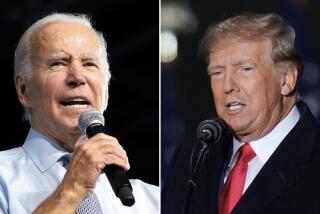Nader Pins Democrats’ Woes on Gore
- Share via
WASHINGTON — The outcome of the presidential election came down to fewer than 2,000 votes in Florida, a state where Green Party candidate Ralph Nader earned more than 95,000 votes. But Nader remained unrepentant Wednesday over the possibility that his third-party showing may put a conservative Republican in the White House.
Nader turned aside questions suggesting that his quixotic bid, aimed more at launching a progressive political movement than winning the presidency, had made him a spoiler.
“I’ve always said that it was Al Gore’s election to lose and that only Al Gore could beat Al Gore,” Nader said in a morning news conference at the National Press Club.
Nader drew wisps of support in nearly every state, although he was not on the ballot in three states and was a write-in candidate in four others. His support reached 3% nationwide, short of the 5% needed to qualify for federal matching funds in 2004, one of his campaign’s goals. Nader did best in Alaska, where he garnered 10% of the vote.
Nader appeared to have the greatest effect on the presidential race in Oregon, New Hampshire and Florida, which emerged as critical states. Vice President Gore, with 260 electoral votes, would have reached 271--one more than needed for victory--with wins in New Hampshire and Oregon. By late Wednesday, Texas Gov. George W. Bush, the Republican nominee, appeared to have New Hampshire locked up, but Oregon was still too close to call.
In New Hampshire, which has four electoral votes, Nader received 22,156 votes--far more than Bush’s 7,282-vote margin of victory over Gore. And in Oregon, with its seven electoral votes, Nader pulled 56,264 votes; Bush was leading Gore by 25,859.
Now it is down to Florida, with 25 electoral votes. In the initial unofficial vote count there, Bush was leading Gore by only 1,784 votes. The tally for Nader stood at 96,915.
According to a Florida exit poll, about half of Nader’s supporters--mostly young white male liberals and moderates--would have voted for Gore had Nader not been on the ballot. That likely would have sealed a national victory for the vice president.
Green Party campaign officials have said that nationwide about 30% of their support came from newly registered voters, about 20% from Bush supporters and 40% from Gore backers.
Alan Kobrin, Nader’s Florida field coordinator, said the campaign there had received several “nasty . . . almost threatening” telephone calls Wednesday from people outraged about the initial vote results.
“We’re getting calls of support as well,” Kobrin said. “People are upset over the way we’ve been treated and blamed for the absolute failure of the Democrats to knock out an idiot like George Bush. Suddenly, we’re the reason they lost. . . . When the numbers go wrong they have to blame somebody.”
Count Ken Cook, president of the Environmental Working Group, among the blamers. Should Bush prevail, he said, activists for a wide range of social issues likely will be forced into a defensive position to protect anticipated Republican challenges to environmental and consumer regulations.
“I think it is an absolute disaster for the public interest community that this guy [Nader], in large measure, created,” Cook said. “Not only did he not get his matching funds, but he has consigned the public interest community to a defensive war that’s going to cost us tens of millions of dollars in each of these areas each year.”
On the other hand, Nader’s campaign has sparked “a crisis” that could spur debate about the future of third-party candidates in a nation that has been dominated by two parties for more than a century, said Theodore J. Lowi, a professor of government at Cornell University.
“We believe so much in the religion of the two-party system,” said Lowi, a multi-party system advocate. “It’s time people got used to the idea that we’re a very complex, 21st century country, and the two-party system is a 19th century institution.”
Nader has maintained that his main interest is in building a viable progressive movement that can affect policy debates in Washington, which he believes has not happened under the conservative and moderate administrations of Ronald Reagan, George Bush and Bill Clinton.
Yet if Bush wins the White House and Democrats blame Nader, he likely would face even more difficulties in finding sympathetic ears among policymakers. Nader shrugged off such speculation.
“The citizen groups in this city have been shut out already,” Nader said. “I don’t think people here realize how much ground has been lost by citizen groups in the last 20 years.”
More to Read
Get the L.A. Times Politics newsletter
Deeply reported insights into legislation, politics and policy from Sacramento, Washington and beyond. In your inbox twice per week.
You may occasionally receive promotional content from the Los Angeles Times.











